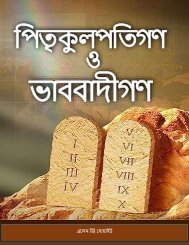Finishing the Race
Of all the games instituted among the Greeks and the Romans, the races were the most ancient and the most highly esteemed … The contests were governed by strict regulations, from which there was no appeal. Those who desired their names entered as competitors for the prize had first to undergo a severe preparatory training. Harmful indulgence of appetite, or any other gratification that would lower mental or physical vigour, was strictly forbidden. For one to have any hope of success in these trials of strength and speed, the muscles must be strong and supple, and the nerves well under control. Every movement must be certain, every step swift and unswerving; the physical powers must reach the highest mark.
Of all the games instituted among the Greeks and the Romans, the races were the most ancient and the most highly esteemed … The contests were governed by strict regulations, from which there was no appeal. Those who desired their names entered as competitors for the prize had first to undergo a severe preparatory training. Harmful indulgence of appetite, or any other gratification that would lower mental or physical vigour, was strictly forbidden. For one to have any hope of success in these trials of strength and speed, the muscles must be strong and supple, and the nerves well under control. Every movement must be certain, every step swift and unswerving; the physical powers must reach the highest mark.
You also want an ePaper? Increase the reach of your titles
YUMPU automatically turns print PDFs into web optimized ePapers that Google loves.
whatever <strong>the</strong>y chose, and brutally abusing men, women, and children. In some instances,<br />
public notices were posted, calling upon those who desired to assist in breaking <strong>the</strong><br />
windows and robbing <strong>the</strong> houses of <strong>the</strong> Methodists, to assemble at a given time and place.<br />
These open violations of both human and divine law were allowed to pass without a<br />
reprimand. A systematic persecution was carried on against a people whose only fault was<br />
that of seeking to turn <strong>the</strong> feet of sinners from <strong>the</strong> path of destruction to <strong>the</strong> path of holiness.<br />
Said John Wesley, referring to <strong>the</strong> charges against himself and his associates: "Some<br />
allege that <strong>the</strong> doctrines of <strong>the</strong>se men are false, erroneous, and enthusiastic; that <strong>the</strong>y are<br />
new and unheard-of till of late; that <strong>the</strong>y are Quakerism, fanaticism, popery. This whole<br />
pretense has been already cut up by <strong>the</strong> roots, it having been shown at large that every<br />
branch of this doctrine is <strong>the</strong> plain doctrine of Scripture interpreted by our own church.<br />
Therefore it cannot be ei<strong>the</strong>r false or erroneous, provided <strong>the</strong> Scripture be true." "O<strong>the</strong>rs<br />
allege, "Their doctrine is too strict; <strong>the</strong>y make <strong>the</strong> way to heaven too narrow.' And this is in<br />
truth <strong>the</strong> original objection, (as it was almost <strong>the</strong> only one for some time,) and is secretly at<br />
<strong>the</strong> bottom of a thousand more, which appear in various forms. But do <strong>the</strong>y make <strong>the</strong> way to<br />
heaven any narrower than our Lord and His apostles made it? Is <strong>the</strong>ir doctrine stricter than<br />
that of <strong>the</strong> Bible? Consider only a few plain texts: 'Thou shalt love <strong>the</strong> Lord thy God with all<br />
thy heart, and with all thy mind, and with all thy soul, and with all thy strength.' 'For every<br />
idle word which men shall speak, <strong>the</strong>y shall give an account in <strong>the</strong> day of judgment.'<br />
'Whe<strong>the</strong>r ye eat, or drink, or whatever ye do, do all to <strong>the</strong> glory of God.'<br />
"If <strong>the</strong>ir doctrine is stricter than this, <strong>the</strong>y are to blame; but you know in your conscience<br />
it is not. And who can be one jot less strict without corrupting <strong>the</strong> word of God? Can any<br />
steward of <strong>the</strong> mysteries of God be found faithful if he change any part of that sacred<br />
depositum? No. He can abate nothing, he can soften nothing; he is constrained to declare to<br />
all men, 'I may not bring down <strong>the</strong> Scripture to your taste. You must come up to it, or perish<br />
forever.' This is <strong>the</strong> real ground of that o<strong>the</strong>r popular cry concerning '<strong>the</strong> uncharitableness of<br />
<strong>the</strong>se men.' Uncharitable, are <strong>the</strong>y? In what respect? Do <strong>the</strong>y not feed <strong>the</strong> hungry and clo<strong>the</strong><br />
<strong>the</strong> naked? 'No; that is not <strong>the</strong> thing: <strong>the</strong>y are not wanting in this: but <strong>the</strong>y are so<br />
uncharitable in judging! <strong>the</strong>y think none can be saved but those of <strong>the</strong>ir own way.'"-- Ibid.,<br />
vol. 3, pp. 152, 153.<br />
The spiritual declension which had been manifest in England just before <strong>the</strong> time of<br />
Wesley was in great degree <strong>the</strong> result of antinomian teaching. Many affirmed that Christ had<br />
abolished <strong>the</strong> moral law and that Christians are <strong>the</strong>refore under no obligation to observe it;<br />
that a believer is freed from <strong>the</strong> "bondage of good works." O<strong>the</strong>rs, though admitting <strong>the</strong><br />
perpetuity of <strong>the</strong> law, declared that it was unnecessary for ministers to exhort <strong>the</strong> people to<br />
obedience of its precepts, since those whom God had elected to salvation would, "by <strong>the</strong><br />
irresistible impulse of divine grace, be led to <strong>the</strong> practice of piety and virtue," while those<br />
who were doomed to eternal reprobation "did not have power to obey <strong>the</strong> divine law."<br />
158


















